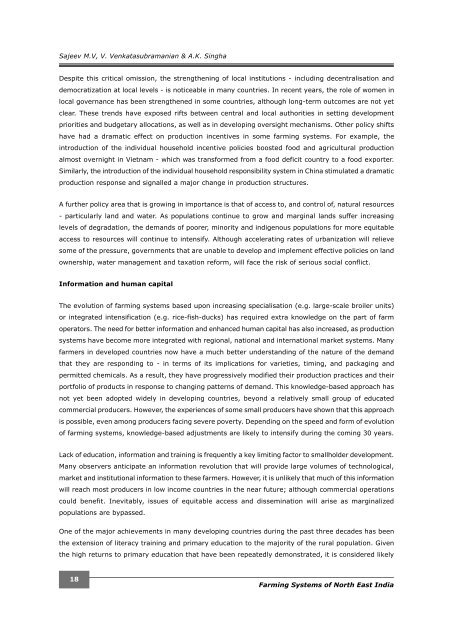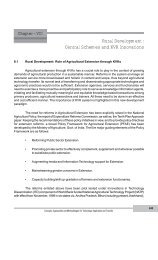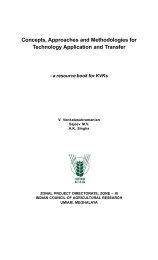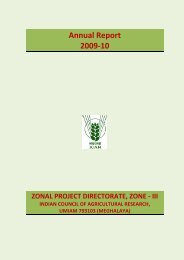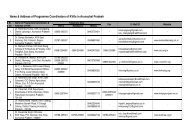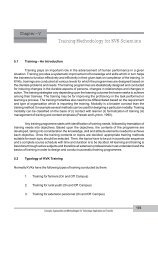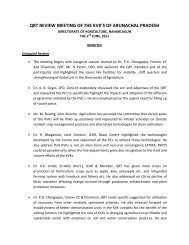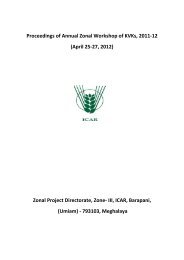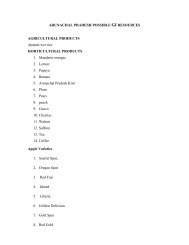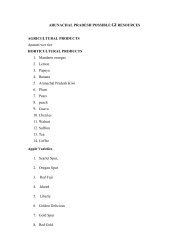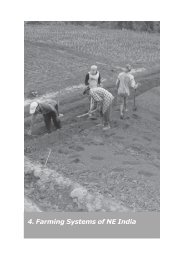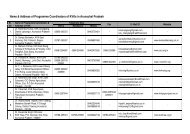Sajeev M.V, V. Venkatasubramanian & A.K. Singhain many farming systems during the 1980s and early 1990s, as a result of reductions in governmentsupport and declining prices for major smallholder products.In the longer run as barriers to trade between countries diminish, and if subsidies to producers inindustrialized countries are removed, developing country products that are competitive in world marketswill benefit, replacing those that have hitherto relied on protection. Broad social, economic and culturaltrends will also contribute to a profound reshaping of market demand, as increased urbanization, risingincomes, improved communications and the diffusion of cultural preferences exert their effect. Theavailability of new production, post-harvest and transport technologies will also change demand patterns,by making possible the delivery of new products - or established products in new forms - to marketswhere they have been previously unattainable.Policies, institutions and public goodsThe development of dynamic farming systems requires a conducive policy environment. Moreover, theestablishment of the farm-rural-urban linkages described by Mellor, 2000 requires effective demand.The greatest change in this environment during the past 30 years has been structural adjustment, thewidespread introduction of which marked another step in a key policy trend that can be discerned overthe last few decades; the decline of national food self-sufficiency as a dominant element in the shapingof policies for rural areas. In the 1960s, the perceived need to ensure national food security wasparamount for many governments and was used to justify direct intervention in agricultural marketing,storage, import licensing, input subsidies and other areas. Although national food self-sufficiency is nolonger an overriding policy aim, food security remains a key policy issue for developing countries andindeed for the whole world. This was emphasized in the FAO-sponsored World Food Summit of 1996 andthe follow-up development activities.As structural adjustment programmes have progressed, policy makers have increasingly shifted theirattention to the potential to increase the efficiency of service delivery through the restructuring ofinstitutions. This has led to several results with enormous long-term impact: the shift of many traditionallypublic sector roles to civil society and the private sector; the decentralization of remaining governmentservices; and an increasing reduction of government investment in the provision of public services.The first two trends fit well within the growing tendency, at a broader social level, to encourage morelocal participation in decision making and resource allocation. The third is largely an outcome of theshedding of many previous governmental responsibilities to the private sector. These tendencies willprobably continue to gain importance during the next one or two decades. However, while such trendsoffer significant benefits in terms of mobilisation of non-governmental resources and a better alignmentof public activities to local needs, they have also created constraints. There has been a generally slowor erratic supply response from the private sector, which in many countries has experienced difficultiesin effectively replacing public services in finance, research, extension, education, health and even ininfrastructure development and maintenance - particularly in rural areas where poverty is widespread.Smaller farmers and female-headed households have suffered disproportionately. The missing elementhas been the creation of the new public services required to create a supportive environment for thegrowth of private sector activities and to ensure equity and environmental sustainability.<strong>Farming</strong> <strong>Systems</strong> of North East India17
Sajeev M.V, V. Venkatasubramanian & A.K. SinghaDespite this critical omission, the strengthening of local institutions - including decentralisation anddemocratization at local levels - is noticeable in many countries. In recent years, the role of women inlocal governance has been strengthened in some countries, although long-term outcomes are not yetclear. These trends have exposed rifts between central and local authorities in setting developmentpriorities and budgetary allocations, as well as in developing oversight mechanisms. Other policy shiftshave had a dramatic effect on production incentives in some farming systems. For example, theintroduction of the individual household incentive policies boosted food and agricultural productionalmost overnight in Vietnam - which was transformed from a food deficit country to a food exporter.Similarly, the introduction of the individual household responsibility system in China stimulated a dramaticproduction response and signalled a major change in production structures.A further policy area that is growing in importance is that of access to, and control of, natural resources- particularly land and water. As populations continue to grow and marginal lands suffer increasinglevels of degradation, the demands of poorer, minority and indigenous populations for more equitableaccess to resources will continue to intensify. Although accelerating rates of urbanization will relievesome of the pressure, governments that are unable to develop and implement effective policies on landownership, water management and taxation reform, will face the risk of serious social conflict.Information and human capitalThe evolution of farming systems based upon increasing specialisation (e.g. large-scale broiler units)or integrated intensification (e.g. rice-fish-ducks) has required extra knowledge on the part of farmoperators. The need for better information and enhanced human capital has also increased, as productionsystems have become more integrated with regional, national and international market systems. Manyfarmers in developed countries now have a much better understanding of the nature of the demandthat they are responding to - in terms of its implications for varieties, timing, and packaging andpermitted chemicals. As a result, they have progressively modified their production practices and theirportfolio of products in response to changing patterns of demand. This knowledge-based approach hasnot yet been adopted widely in developing countries, beyond a relatively small group of educatedcommercial producers. However, the experiences of some small producers have shown that this approachis possible, even among producers facing severe poverty. Depending on the speed and form of evolutionof farming systems, knowledge-based adjustments are likely to intensify during the coming 30 years.Lack of education, information and training is frequently a key limiting factor to smallholder development.Many observers anticipate an information revolution that will provide large volumes of technological,market and institutional information to these farmers. However, it is unlikely that much of this informationwill reach most producers in low income countries in the near future; although commercial operationscould benefit. Inevitably, issues of equitable access and dissemination will arise as marginalizedpopulations are bypassed.One of the major achievements in many developing countries during the past three decades has beenthe extension of literacy training and primary education to the majority of the rural population. Giventhe high returns to primary education that have been repeatedly demonstrated, it is considered likely18<strong>Farming</strong> <strong>Systems</strong> of North East India
- Page 3 and 4: We sincerely acknowledge theconstan
- Page 5 and 6: PREFACEFarming System Research/Exte
- Page 7 and 8: 2. Methodology2.1.0 Selection of Di
- Page 9 and 10: 4.2.3 Farming Systems of Darrang 41
- Page 11 and 12: 5.3.3 Research priorities and strat
- Page 13 and 14: 6.6 Development strategies for Naga
- Page 15 and 16: Blank Page
- Page 17 and 18: Sajeev M.V, V. Venkatasubramanian &
- Page 19 and 20: Sajeev M.V, V. Venkatasubramanian &
- Page 21 and 22: Sajeev M.V, V. Venkatasubramanian &
- Page 23 and 24: Sajeev M.V, V. Venkatasubramanian &
- Page 25 and 26: Sajeev M.V, V. Venkatasubramanian &
- Page 27 and 28: Sajeev M.V, V. Venkatasubramanian &
- Page 29 and 30: Sajeev M.V, V. Venkatasubramanian &
- Page 31: Sajeev M.V, V. Venkatasubramanian &
- Page 35 and 36: Sajeev M.V, V. Venkatasubramanian &
- Page 37 and 38: Sajeev M.V, V. Venkatasubramanian &
- Page 39 and 40: Sajeev M.V, V. Venkatasubramanian &
- Page 41 and 42: Sajeev M.V, V. Venkatasubramanian &
- Page 43 and 44: Sajeev M.V, V. Venkatasubramanian &
- Page 45: Sajeev M.V, V. Venkatasubramanian &


